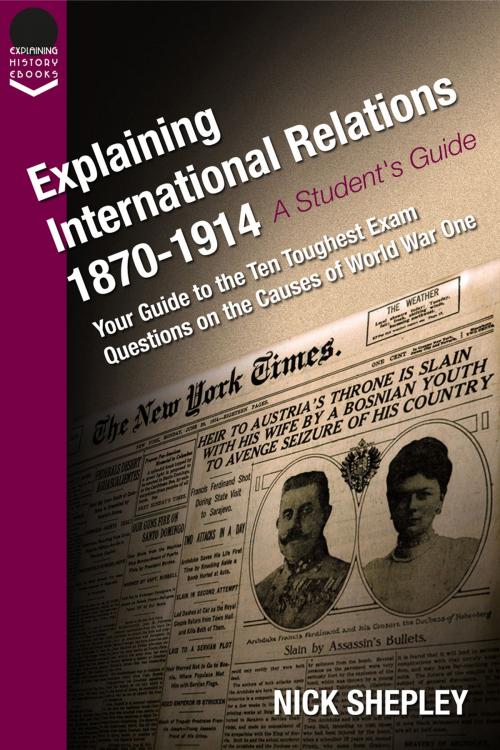Explaining International Relations 1870-1914
Your guide to the ten toughest exam questions on the causes of World War One
Nonfiction, History, Modern, 19th Century, European General| Author: | Nick Shepley | ISBN: | 9781785382390 |
| Publisher: | Andrews UK | Publication: | December 7, 2015 |
| Imprint: | AUK Academic | Language: | English |
| Author: | Nick Shepley |
| ISBN: | 9781785382390 |
| Publisher: | Andrews UK |
| Publication: | December 7, 2015 |
| Imprint: | AUK Academic |
| Language: | English |
Between 1870 and 1914 Europe experienced mounting diplomatic tensions and the division of the continent into rival alliance systems. The outbreak of war in 1914 had long term origins which are complex and often obscure. This e-book is written to make these conflicts and the debates that surround them easy to understand and accessible. It covers the following key questions: 1. What as the significance of the Unification of Germany on European diplomacy?2. What were Britain’s main objectives between 1870 and 1904?3. Why did Colonial Empires lead to an increase in tension?4. How did Bismarck’s diplomacy shape European affairs?5. Why were the Balkans such a source of tension?6. What was the significance of the Congress of Berlin?7. How did the fall of Bismarck affect European diplomacy?8. Why did Britain sign the Entente Cordiale?9. How did the crises over Morocco change European affairs?10. How did the arms race contribute to international tensions?This e-book also features: advice on essay writing and addressing complex essay questions, a historiographical essay. There is also a link to Explaining History study notes, essay plans, fact files and more.
Between 1870 and 1914 Europe experienced mounting diplomatic tensions and the division of the continent into rival alliance systems. The outbreak of war in 1914 had long term origins which are complex and often obscure. This e-book is written to make these conflicts and the debates that surround them easy to understand and accessible. It covers the following key questions: 1. What as the significance of the Unification of Germany on European diplomacy?2. What were Britain’s main objectives between 1870 and 1904?3. Why did Colonial Empires lead to an increase in tension?4. How did Bismarck’s diplomacy shape European affairs?5. Why were the Balkans such a source of tension?6. What was the significance of the Congress of Berlin?7. How did the fall of Bismarck affect European diplomacy?8. Why did Britain sign the Entente Cordiale?9. How did the crises over Morocco change European affairs?10. How did the arms race contribute to international tensions?This e-book also features: advice on essay writing and addressing complex essay questions, a historiographical essay. There is also a link to Explaining History study notes, essay plans, fact files and more.















